CESA
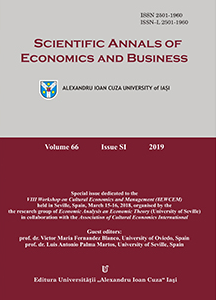
Cultural and creative entrepreneurs in financial crises: Sailing against the tide?
Abstract:
Cultural and creative entrepreneurs in financial crises: Sailing against the tide? Scientific Annals of Economics and Business focuses on a range of idiosyncrasies of cultural and creative entrepreneurs (CCEs) to study the resilience of CCEs in times of crisis (economic, financial and debt crisis). The demographics of CC firms (born and dead), trends and performance and the association between subsidies received and firm survival are analysed. It mainly analyses micro firms in a country where CCEs are particularly financially challenged, namely Portugal. It exploits the unique availability of micro accounting data at the private firm level over an 8-year period (2004-2011), which allows to include the effects of the last financial crisis, and to understand the evolution of the economic success criterion. The results obtained on the impact of subsidies on survival are interesting in both the CCE and the political perspectives, suggesting a positive impact of subsidies in periods of recession, and a negative impact of subsidies in periods of economic growth. Furthermore, CCE firms were found to be more dynamic than other firms in other sectors.
Quotation:
Fontainha, E., & Lazzaro, E. (2019). Cultural and creative entrepreneurs in financial crises: Sailing against the tide?. Scientific Annals of Economics and Business, 66(Special issue – dedicated to the VIII Wo), 73–89. https://doi.org/10.47743/saeb-2019-0022
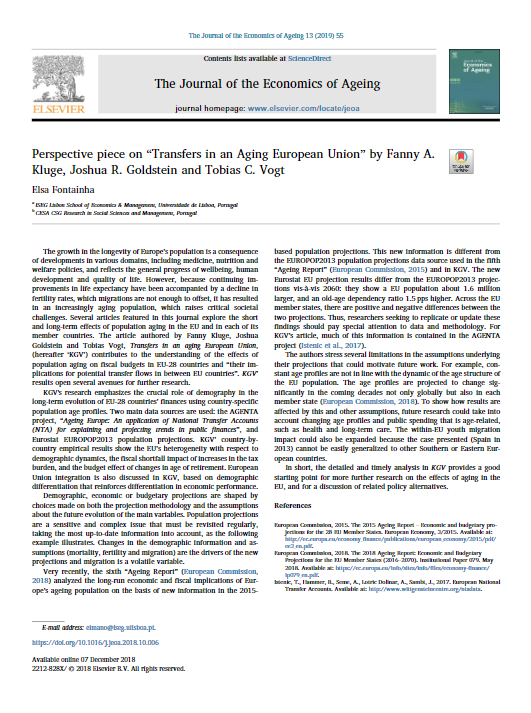
Perspective piece on “Transfers in an Aging European Union” by Fanny A. Kluge, Joshua R. Goldstein and Tobias C. Vogt
Abstract:
The growth in the longevity of Europe’s population is a consequence of developments in various fields, including medicine, nutrition and welfare policies, and reflects overall progress in well-being, human development and quality of life. However, as the continued improvement in life expectancy has been accompanied by a decline in fertility rates, which migration is not sufficient to compensate for, it has resulted in a growing ageing population, which raises critical societal challenges. Several articles presented in this journal explore the short and long-term effects of population ageing in the EU and in each of its member countries. The article written by Fanny Kluge, Joshua Goldstein and Tobias Vogt, Transfers in an ageing European Union, (hereafter “KGV”) contributes to understanding the effects of population ageing on the fiscal budgets of EU-28 countries and “its implications for potential transfer flows between EU countries”. The results of “KGV” open several avenues for further research. Elsa Fontainha comments on the work of Fanny A. Kluge, Joshua R. Goldstein and Tobias C. Vogt on population transfers in the European Union.
Quotation:
Fontainha, E. (2019). Perspective piece on “Transfers in an Ageing European Union” by Fanny A. Kluge, Joshua R. Goldstein and Tobias C. Vogt. Journal of the Economics of Ageing, 13, 55-55. https://doi.org/10.1016/j.jeoa.2018.10.006
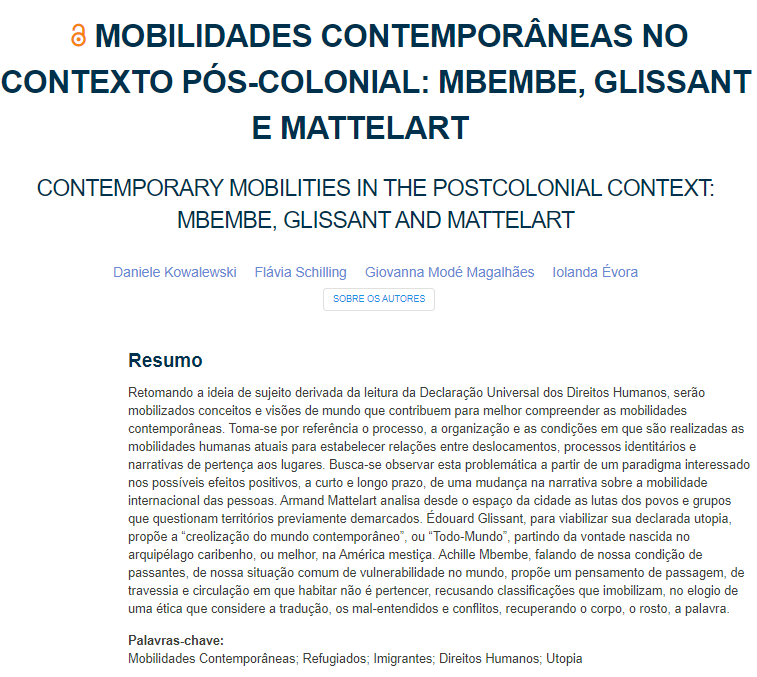
Mobilidades Contemporâneas no Contexto Pós-Colonial: Mbembe, Glissant e Mattelart
Abstract:
Taking up again the idea of subject derived from the reading of the Universal Declaration of Human Rights, concepts and worldviews will be mobilized that contribute to better understand contemporary mobilities. Reference is made to the process, the organization and the conditions in which current human mobilities are carried out to establish relationships between displacement, identity processes and narratives of belonging to places. In Mobilidades Contemporâneas no Contexto Pós-Colonial: Mbembe, Glissant e Mattelart we seek to observe this problematic from a paradigm interested in the possible positive effects, in the short and long term, of a change in the narrative on the international mobility of people. Armand Mattelart analyses, from the space of the city, the struggles of peoples and groups that question previously demarcated territories. To make his declared utopia viable, Édouard Glissant proposes the “creolisation of the contemporary world”, or the “All-World”, starting from the will born in the Caribbean archipelago, or rather, in mestizo America. Achille Mbembe, speaking of our condition of passers-by, of our common situation of vulnerability in the world, proposes a thought of passage, of crossing and circulation in which to inhabit is not to belong, refusing classifications that immobilise, in praise of an ethic that considers translation, misunderstandings and conflicts, recovering the body, the face, the word.
Quotation:
“Kowalewski, Daniele, Schilling, Flávia, Magalhães, Giovanna Modé, & Évora, Iolanda. (2019). Mobilidades Contemporâneas no Contexto Pós-Colonial: Mbembe, Glissant e Mattelart. Lua Nova: Revista de Cultura e Política, (108), 137-156. Epub November 28, 2019. https://doi.org/10.1590/0102-137156/108“
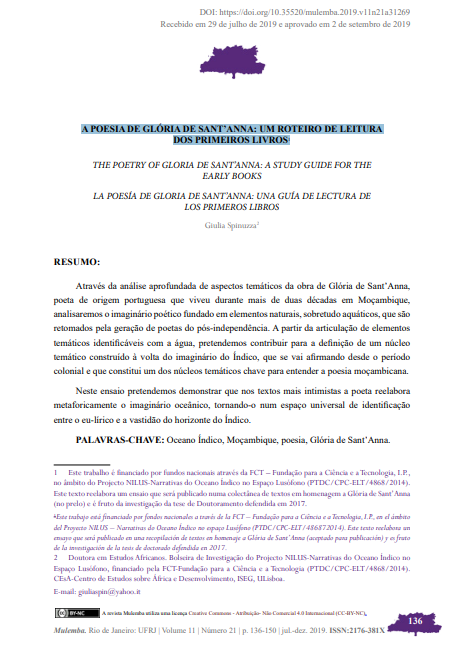
A poesia de Glória de Sant’anna: um roteiro de leitura dos primeiros livros
Abstract:
Through in-depth analysis of thematic aspects of the work of Glória de Sant’Anna, a poet of Portuguese origin who lived for over two decades in Mozambique, we will analyze in A poesia de Glória de Sant’Anna: um roteiro de leitura dos primeiros livros the poetic imaginary based on natural elements, especially aquatic, which are resumed by the generation of post-independence poets. Through the articulation of thematic elements identifiable with water, we intend to contribute to the definition of a thematic core built around the imaginary of the Indian Ocean, which has been asserting itself since the colonial period and which constitutes one of the key thematic cores for understanding Mozambican poetry. In this essay, we intend to demonstrate that in the most intimate texts, the poet metaphorically reworks the oceanic imaginary, turning it into a universal space of identification between the lyric self and the vastness of the Indian Ocean horizon. This work is financed by national funds through FCT – Fundação para a Ciência e a Tecnologia, I.P., under the NILUS-Narratives of the Indian Ocean in the Lusophone Space Project (PTDC/CPC-ELT/4868/2014). This text reworks an essay that will be published in a collection of texts in tribute to Glória de Sant’Anna (in press) and is the result of the research of the PhD thesis defended in 2017.
Quotation:
“Spinuzza, Giulia. A poesia de Glória de Sant’Anna: um roteiro de leitura dos primeiros livros. Mulemba, UFRJ, Brasil, vol. 11, n. 21, Dezembro 2019, p. 136 https://revistas.ufrj.br/index.php/mulemba/issue/view/1302/showToc”
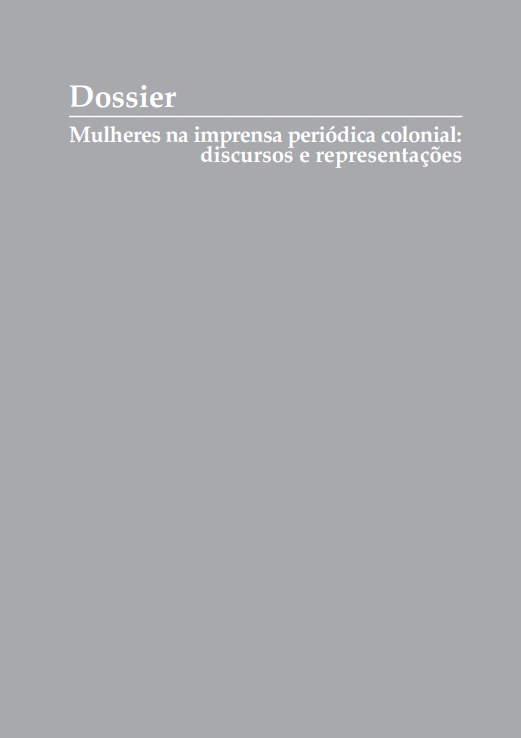
Entre silêncios e interferências: mulheres na imprensa colonial
Abstract:
In Entre silêncios e interferências: mulheres na imprensa periódica colonial we adress the presence of women in the colonial periodical press of the former Portuguese Empire means trying to define, even if only provisionally, the main aspects of the “object” of reflection proposed in the present dossier. Firstly, by proposing a joint approach, under the term “colonial”, of the periodical press published both in the former metropolis and in the various spaces colonised by Portugal, we point to some perspectives of the historiography on European colonialisms which have been shattering polarized visions, analysing the social and political reverberations between metropolis and colonies, the transits of ideas and imaginaries, as well as the “manufactured” dimension of the difference (Burton 1994; Cooper and Stoler 1997). The dossier results from the panel “The ‘women’ and the colonial periodical press” organized in the framework of the International Congress Politics and Culture in the Colonial Periodical Press, which took place from 22 to 25 May 2017, near the CHAM-Centre of Humanities of the New University of Lisbon, in partnership with the CEI-IUL-Centre of International Studies of ISCTE-Instituto Universitário de Lisboa and the CEC-Centre of Comparative Studies of the Faculty of Letters of the University of Lisbon. The Congress was an initiative of the International Study Group of the Colonial Periodical Press of the Portuguese Empire, created by Sandra Ataíde Lobo (CHAM-UNL), Adelaide Vieira Machado (CHAM-UNL) and Cátia Miriam Costa (CEI-IUL). Various entities and researchers from different research centres have joined the Group.
Quotation:
“Falconi, J.; Wieser, D. (2019). Entre silêncios e interferências: mulheres na imprensa periódica colonial, Revista ex aequo- Revista da Associação Portuguesa de Estudos sobre as Mulheres, n. 39. https://doi.org/10.22355/. exaequo.2019.39.01.10.22355/”
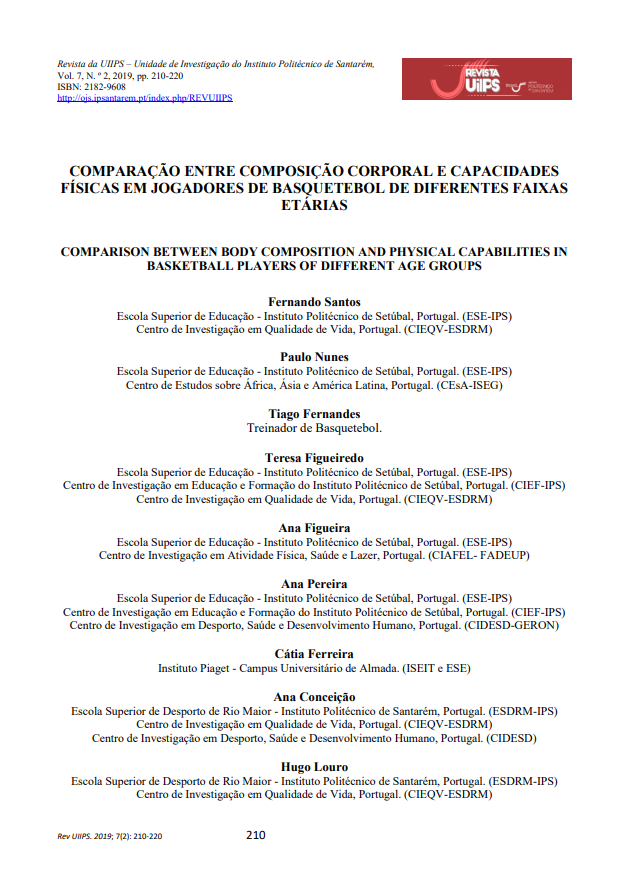
Comparação entre composição corporal e capacidades físicas em jogadores de basquetebol de diferentes faixas etárias
Abstract:
The aim of Comparação entre composição corporal e capacidades físicas em jogadores de basquetebol de diferentes faixas etárias was to compare the relationship between body composition and physical abilities in basketball players aged 12-13 and 14-15 years old. Twenty-four basketball players from a team in the Setúbal Peninsula were involved in the study, twelve belonging to each age group. The involvement of young people and adolescents in regular sports practice has evolved in modern society, and the consensual references in the literature of benefits related to sports practice at physical and cognitive level contribute to this. They made evaluations related to body composition and strength of lower and upper limbs. Correlations were observed between body composition and handgrip strength and an inverse relationship between groups between handgrip strength and countermovement jumping. The muscle mass, showed a close relationship with handgrip strength in both age groups. It is fundamental to evaluate and control the training in the most varied age groups in basketball in order to detect talent, to improve the training prescription and to improve the sport performance.
Quotation:
Santos, F., Nunes, P., Fernandes, J., Figueiredo, T., Figueira, A., Pereira, A., Ferreira, C., Conceição, A., Louro, H., & Espada, M. (2019). Comparação entre composição corporal e capacidades físicas em jogadores de basquetebol de diferentes faixas etárias. Revista UIIPS, 7(2), 210-220.
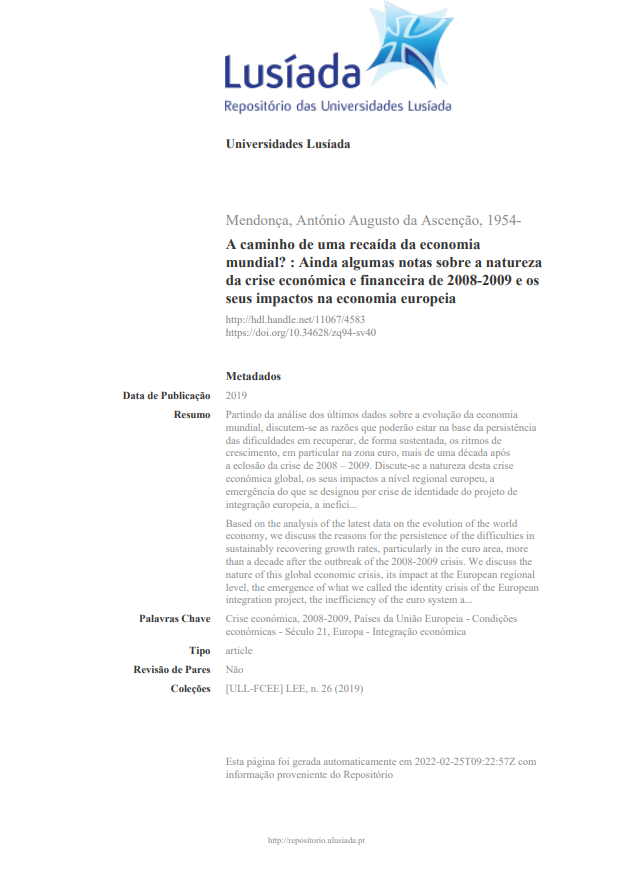
A Caminho de uma Recaída da Economia Mundial? Ainda Algumas Notas sobre a Natureza da Crise Económica e Financeira de 2008-2009 e os seus Impactos na Economia Europeia
Abstract:
Based on the analysis of the latest data on the evolution of the world economy, the reasons that may underlie the persistence of the difficulties in recovering, in a sustained manner, the rates of growth, particularly in the euro zone, more than a decade after the outbreak of the crisis of 2008-2009, are discussed. The nature of this global economic crisis is discussed in A caminho de uma recaída da economia mundial? : Ainda algumas notas sobre a natureza mundial? : Ainda algumas notas sobre a natureza da crise económica e financeira de 2008-2009 e os seus impactos na economia europeia, its impacts at the European regional level, the emergence of what has been called an identity crisis of the European integration project, the inefficiency of the euro system as an adjustment mechanism, internal and external, and the role of unconventional monetary policy. The conclusion is that Europe needs to undertake a profound redefinition of its integration project, including the redesign of the euro system in light of the recent experience of unconventional monetary policy. In this process, it is considered that there is an important place for Portugal, as an Atlantic European country, whose identity was formed and consolidated in the process of constitution of the global economy.
Quotation:
Mendonça, António .2019. A caminho de uma recaída da economia mundial?: Ainda algumas notas sobre a natureza mundial?: Ainda algumas notas sobre a natureza da crise económica e financeira de 2008-2009 e os seus impactos na economia europeia”, Lusíada – Economia & Empresa, nº 26, p. 31-66

CEsA Presents: CEsA Thinks 2022/2023 – Seminars | October 13th, 2022 to February 8th, 2023
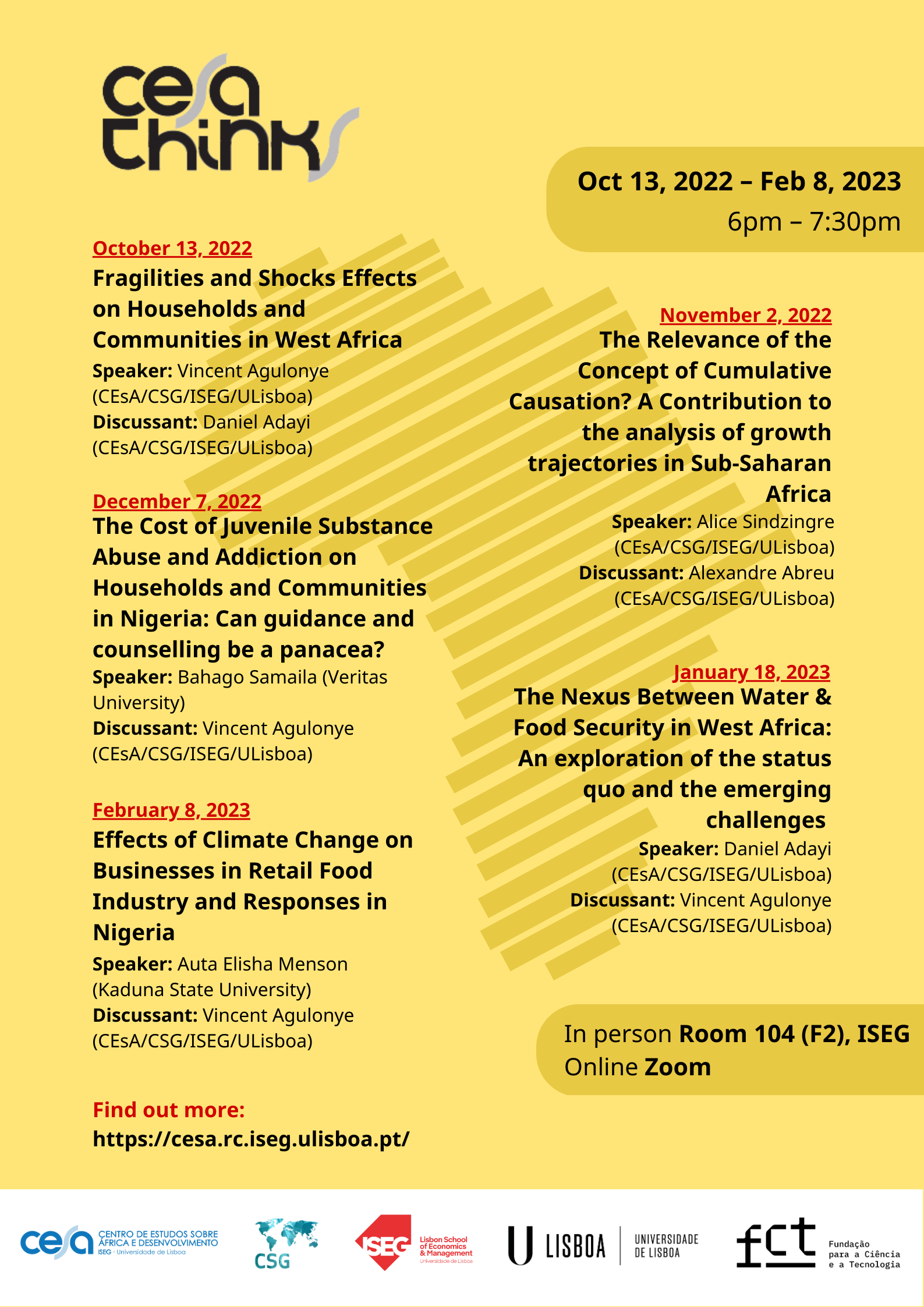
The Centre for African and Development Studies (CEsA/CSG/ISEG/ULisboa) and the ISEG – Lisbon School of Economics and Management, of the University of Lisbon (ULisboa), invite to the CEsA Thinks 2022/2023 – Seminars. The presentations aim to promote peer discussions on current research conducted by researchers in the field of Development, with the aim of generating contributions and criticism of the works presented.
The events will take place from October 13th, 2022 to February 8th, 2023, one Wednesday a month (from November 2nd), from 6pm to 7:30pm (Lisbon time). The meetings will take place in a hybrid format (in person at ISEG – Room 104, Francesinhas 2, and online via Zoom) and will be open to the public. See the full program in the poster.
Organized by the CEsA researchers Vincent Agulonye and Daniel Adayi, the CEsA Thinks 2022 presentations are in English.
CEsA Thinks 2022/2023
From October 13th, 2022 to February 8th, 2023, monthly, from 6pm to 7:30pm (Lisbon time).
Hybrid format: face-to-face in Room 104 (Francesinhas 2, ISEG, Lisbon), with online broadcast via Zoom (https://us06web.zoom.us/j/87919779125?pwd=cmtENi9lVWxRNjBCdHhXaDdCZ0lHUT09).
More about the organizers:
Vincent Agulonye:
Since 2006, Vincent has worked in the private sector in Nigeria. He started in the education sector in 2006 where he served as an English teacher at St. Mary’s College, Suleja, Niger State. He was Head of the English and Literature Department, Coordinator of the Press Club, Literary Club, Quiz and Debate Competition, and Editor of the School Magazine. He was a Student Journalist from 2004 to 2006 (where he served in various capacities, including Board Secretary, Assistant Editor and Editor-in-Chief). He served as an English language teacher during his national service in the far northeastern city of Nigeria, Maiduguri. He started working in the telecommunications industry soon after his national assignment in 2009. He worked for the largest private telecommunications company in Nigeria, MTN Nigeria in Kaduna and Kano. In 2010, he enrolled in graduate education at the National Teachers Institute and Usmanu DanFodiyo University, graduate program in Sokoto. In 2011, he enrolled in the Graduate Program in Mass Communication at Bayero University in Kano. After that, he pursued a PhD in Development Studies at ISEG, University of Lisbon. At the moment, he is involved in studying development trends in Nigeria’s private sector (especially in the manufacturing industry) in Anambra.
Daniel Adayi:
Daniel Adayi, PhD, is a Catholic missionary priest and a researcher with the Centre for African and Development Studies (CEsA/CSG/ISEG/ULisboa). He obtained his doctorate in Development Studies from ISEG in 2019 for research on the political economy of River Basin Development Authorities in Nigeria. His current research focuses on the interplay of institutions in food and water resources management in emerging economies. With an academic background in Philosophy, Environmental Engineering Chemistry and Sacred Sciences, Adayi employs interdisciplinary and multidisciplinary methodological tools for his analyses. He lives in London and is the Parish Priest of Saints Michael and Matin Church, Hounslow, in the West of London.
Author: CEsA Communication (comunicacao@cesa.iseg.ulisboa.pt)
Image: CEsA/Reproduction
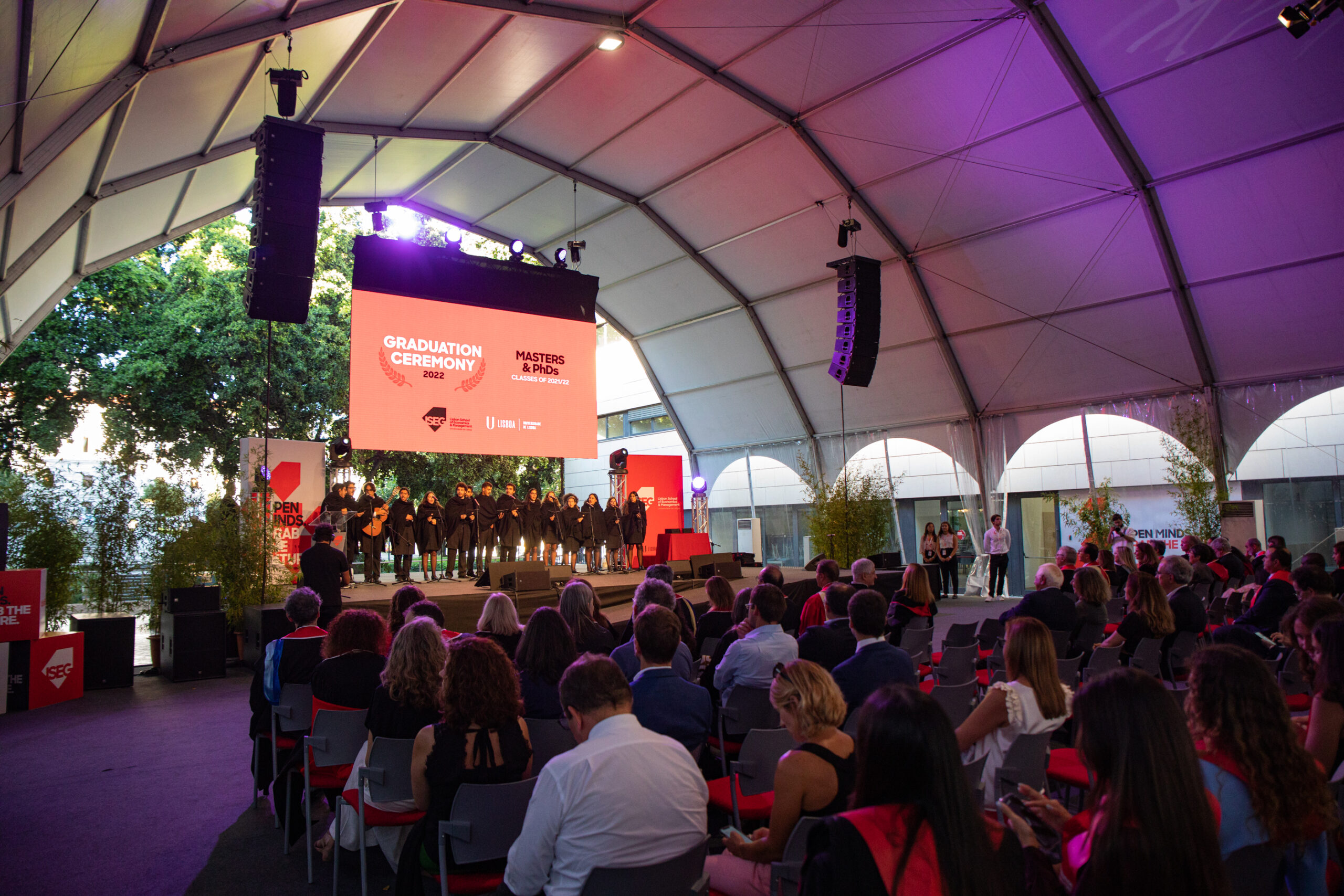
ISEG Graduation Ceremony awards certificates to graduate PhD and Masters’ students in Development Studies
Graduates of the PhD Program in Development Studies (PDED, ISEG/ICS/IGOT/ISA/ULisboa) and the Masters Program in Development and International Cooperation (MDCI, ISEG/ULisboa) were awarded their certificates in the 2022 Graduation Ceremony held on September 9, 2022, at ISEG.
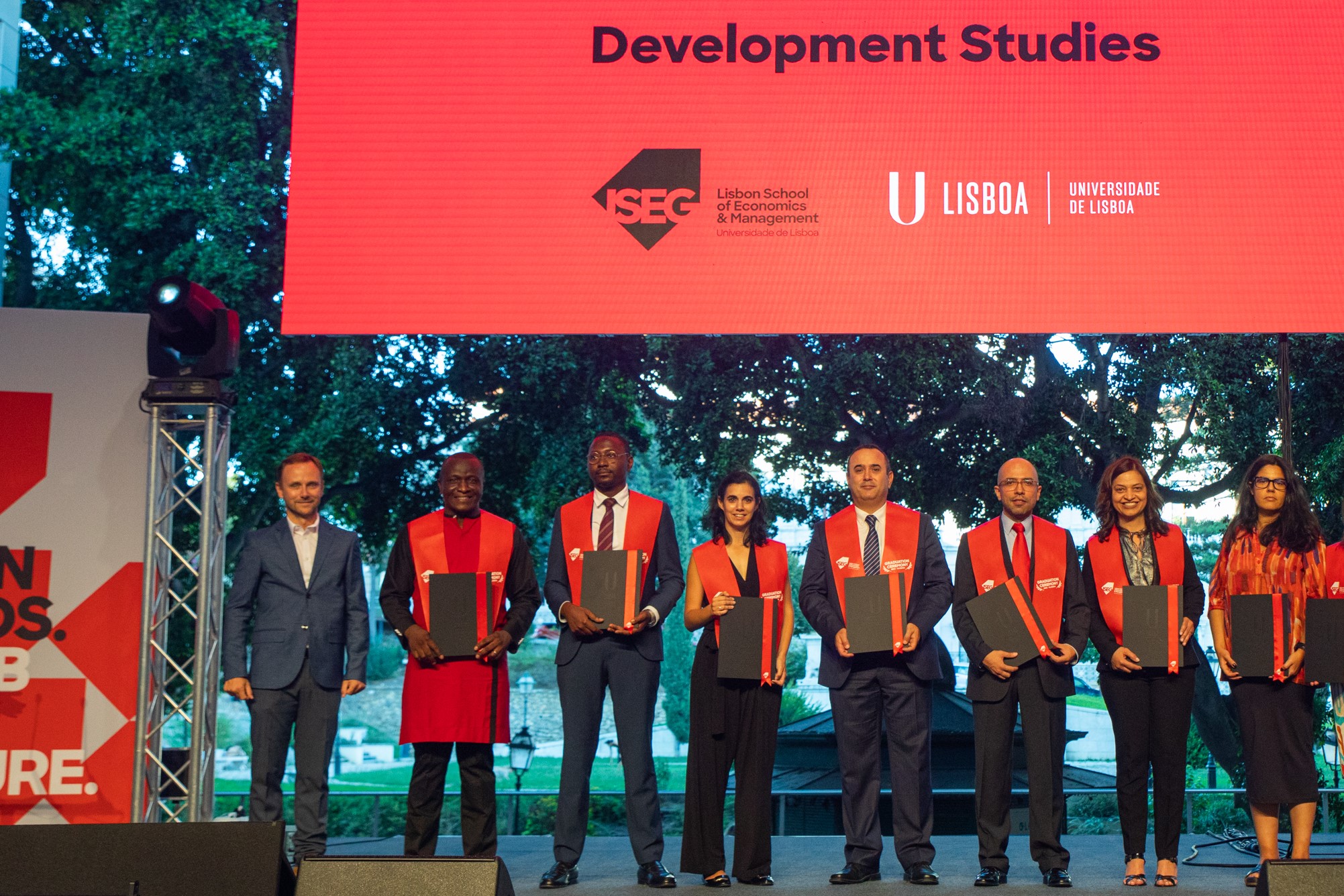

The Master’s graduates are: Andressa Prado, Beatriz Sá, Catarina Leão, Daniela Fernandes, Emerson Santana, Flávia Gorgulho, Gonçalo Lúcio, Gustavo Costa, Haiyun Wu, Hou Jingying, Indira Lukeny Pedro de Araújo, Janine Alexandra da Silva Duarte, Jean Vieira, Jiang Luo, João Rabita, Lei Hao, Liu Zhaoning, Manuel Belo, Mariana Duarte, Mariana Jadaugy, Mariana Silvério, Phillip Sgrillo, Renata Vieira de Assis, Rita Gonçalves, Teresa Garcia, Tracy Jamu e Yu Youhai.
The PhD’s graduates are: Alano da Fonseca Soares Sicato, Ana Luisa Paulino Coutinho, Asif Dawar, Daniel Adayi, Diogo Maia, Fabian Garzon-Cuervo, Joana Joaquim, Lawrence Sciberras, Maria Silva, Maria Afonso, Mojgan Chapariha, Pedro Duarte, Rosa Andrade, Subarna Basnet, Susana Brissos e Uzoma Agulonye.
We congratulate our PhDs and Masters’ graduates! The CEsA (CSG/ISEG/ULisboa) is part of to the Scientific and Pedagogical Committee of the PDED and the MDCI, supporting lectures of curricular units, organization of seminars and academic events, and supervising students’ final papers and theses, framing them in the research lines of the Center.
The 2022 Graduation Ceremony can be watched below and on ISEG’s YouTube channel (click here)
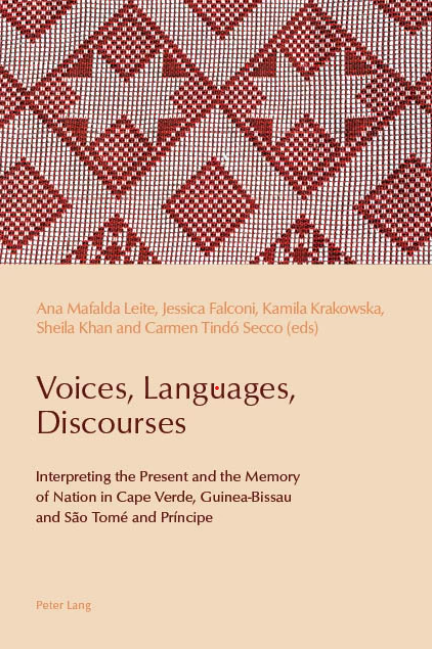
Voices, Languages, Discourses: Interpreting the present and the memory of Nation in Cape Verde, Guinea-Bissau and São Tomé and Príncipe
Abstract:
Voices, Languages, Discourses: Interpreting the Present and the Memory of Nation in Cape Verde, Guinea-Bissau and São Tomé and Príncipe brings together a selection of interviews with writers and filmmakers from Cape Verde, Guinea-Bissau and São Tomé and Príncipe in order to examine representations and images of national identity in these countries’ postcolonial narratives. It continues and completes the exploration of the postcolonial imaginary and identity of Portuguese-speaking Africa presented in the previous interview volume Speaking the Postcolonial Nation: Interviews with Writers from Angola and Mozambique (2014). Memory, history, migration and diaspora are central notions in the recreation and reconceptualisation of the nation and its identities in Cape Verdean, Guinean and São Tomense literary and film culture. By bringing together different generations of writers and filmmakers, with a wide variety of perspectives on the historical, social and cultural changes that occurred in their countries, this book makes a valuable contribution to current debates on post-colonialism, nation and identity in these former Portuguese colonies.
Quotation:
Leite, A., M., Falconi, J., Krakowska, K., Kahn, S., Secco, C. (2020). Voices, Languages, Discourses: Interpreting the Present and the Memory of Nation in Cape Verde, Guinea-Bissau and São Tomé and Príncipe. Oxford, United Kingdom: Peter Lang Verlag. Retrieved Oct 6, 2022, from https://www.peterlang.com/document/1055586





